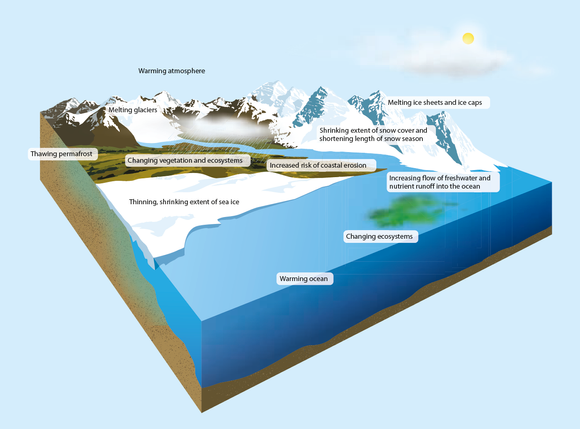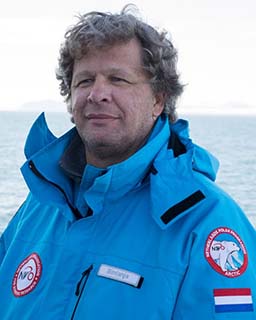New UG Chair to focus on consequences of climate change and an ice-free Arctic
The Arctic is undergoing rapid and turbulent changes: the temperature is rising two to three times faster than in the rest of the world, sea ice is melting at lightning speed and precipitation is increasing. What will these changes lead to? Are we headed towards an ice-free Arctic, with temperatures so mild that rainfall will replace snow as the norm? If so, what are the consequences for, for instance, Arctic ecosystems and the carbon cycle? These questions will be addressed in Prof. Richard Bintanja's inaugural address at the University of Groningen on 6 February 2018, when he accepts the new Chair in Climate and Environmental Change at the Faculty of Science and Engineering.
In this lecture, Bintanja – Senior Researcher Climate Change at the KNMI since 1995 – will propose that the UG Energy and Sustainability Research Institute Groningen (ESRIG) and the KNMI join forces to address these questions. ESRIG is specialized in recording observational knowledge about Arctic ecosystems and processes that determine the concentration of CO2, i.e. the carbon cycle, while the KNMI boasts the well established climate model EC-Earth, which is currently being expanded into an Earth System Model
More accurate scenarios
Richard Bintanja is an expert in Arctic Studies and has undertaken several trips to the North Pole area. It is well known that the area will undergo enormous change with all sorts of major consequences in the coming decades. Bintanja: ‘I was on Spitsbergen two years ago, where I physically experienced how rapidly Arctic glaciers are retreating at the moment. According to a relatively recent naval chart of the area, we were supposed to be sailing through an ice field, but there was no ice field to be seen anywhere. This is a precursor to the great changes. At the University of Groningen, I intend to unite the Arctic climate, ecology and carbon cycle into one overarching model. This will provide us with a better understanding of what lies ahead in terms of direct and indirect effects, not only for the Arctic climate and ecosystems, but also, for example, for the climate in our own region.’

About the Chair
The Chair in Climate and Environmental Change intends to cleverly link the observational knowledge of the carbon cycle and ecosystems obtained within ESRIG to the KNMI's work in climate modeling. By focusing model validation on the interactions between climate on the one hand and the carbon cycle and ecosystems on the other, this global Earth System Model will be able to obtain more accurate estimations regarding the future of the Arctic. These estimations will indicate when and how the sea ice will disappear and what the consequences will be for marine Arctic ecosystems, for example. They allow for the development of a more accurate scenario of the major changes that await the Arctic and the areas beyond in the near future.

Richard Bintanja
Professor Bintanja (1967) graduated in 1990 in Meteorology and Physical Oceanography at Utrecht University. He received his PhD in 1995, also at Utrecht University, with the thesis entitled “The Antarctic Ice Sheet and Climate.” Being a senior climate researcher at KNMI , he employs global climate modelling to make projections of future climate change (polar and global), and he uses these to assess climate feedbacks, climate sensitivity and hydrological changes.
Prof. R. Bintanja's inaugural address will take place on Tuesday 6 February 2018 at 4.15 p.m. in the Auditorium of the Academy Building, Broerstraat 5, Groningen . The lecture will also be streamed live on this website. Title of the inaugural speech: The Arctic: a dark future? The field is: Climate and Environmental Change
More news
-
15 September 2025
Successful visit to the UG by Rector of Institut Teknologi Bandung
